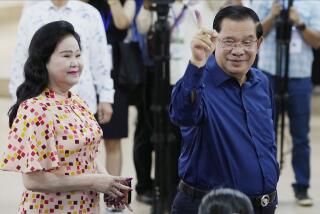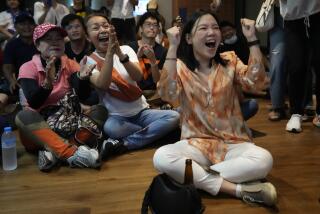Electoral Dispute Stalls Cambodia Accord : Peace talks: The four parties will meet again in October to try to resolve the deadlock.
- Share via
PATTAYA, Thailand — A dispute over elections was left unresolved Thursday as the four factions in Cambodia completed four days of peace talks, dashing hopes of reaching an early settlement to their 12 years of conflict.
Prince Norodom Sihanouk, who chaired the negotiations, said the four parties have resolved outstanding differences over military demobilization and human rights.
But he said the impasse over the details of an internationally supervised election remained his “one failure” at the talks and that the four parties will meet in this Thai beach resort Oct. 21 to try to resolve the deadlock.
Sihanouk, 69, deposed from power in 1970, said he still plans a triumphant return to his homeland in November, whether a peace plan is formally signed or not. But he was clearly disappointed that he will not have a completed peace agreement to present to the five permanent members of the U.N. Security Council.
Representatives of the big five--the United States, the Soviet Union, China, Britain and France--have gathered in Pattaya to review the results of the Cambodian talks today. Their governments drafted a peace plan last November providing for U.N. supervision of the country from the declaration of a cease-fire in the civil war to the holding of free, fair elections.
The Phnom Penh government and the three members of a resistance coalition met in Pattaya for four days trying to narrow differences over the U.N.-prepared draft accord.
Unless the two sides reach a agreement, the United Nations is unlikely to send troops or commit money to monitor the settlement.
Sihanouk said the four factions, part of an interim coalition government known as the Supreme National Council, have shown “mutual understanding, flexibility and concessions in order to create a good atmosphere for strengthening the national unity of Cambodia.”
The principal agreement came on the thorny question of demobilization of military forces. Under a compromise adopted at Pattaya, the four parties agreed to reduce their military forces by 70%, including weapons, ammunition and other equipment. The rest will be put in special camps under U.N. supervision.
In another agreement, the council agreed to make Sihanouk the arbiter of disputes arising over the supreme council’s U.N. dealings; the big five nations had demanded such an agreement because of the cumbersome requirement of reaching unanimous decisions in all council deliberations.
On Thursday, the Phnom Penh government also dropped a sheaf of amendments to the big five nations’ accord, which, in effect, would have condemned human rights violations carried out under the Khmer Rouge, hard-line Communists whose brutal four-year reign in the late 1970s caused an estimated 1 million deaths.
Instead, the final documents will simply state that Cambodia’s “recent tragic history” requires special measures to protect human rights. The country’s new constitution will also contain a bill of rights to guarantee basic freedoms.
The council agreed unanimously that Cambodia in the future will be a “Western-style” liberal democracy with a multi-party system of government. The country now has a one-party, Communist government, which has carried out limited reforms.
The one area of disagreement centered on the proposal by the big five nations for a national election based on proportional representation. Under the proposal, each party would receive the same percentage of seats in Parliament as its vote in the election, with representatives chosen from a national list. Thus, if a party received 15% of the vote, it would get 15% of the seats.
Phnom Penh is insisting that the elections be on a constituency-by-constituency basis, with the winner requiring only a simple majority. Western diplomats said a tiny anti-Communist group, the U.S.-backed Khmer People’s National Liberation Front, insisted on the proportional formula because it would probably receive no seats if the election were conducted on a simple majority basis in each constituency.
Sihanouk said that he favors the system advocated by the Phnom Penh government because 80% of Cambodians live in rural areas and need to know their representatives in government.
Otherwise, he said, “there would be a crisis between the people in the villages and cities and the deputies of those people appointed for them by the political parties.”
More to Read
Sign up for Essential California
The most important California stories and recommendations in your inbox every morning.
You may occasionally receive promotional content from the Los Angeles Times.













